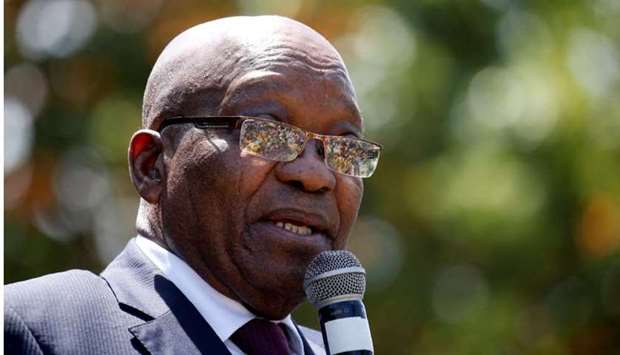South Africa’s former president Jacob Zuma, who has been in police detention since Wednesday night as he started a 15-month prison sentence for contempt, will be eligible for parole after around four months, the justice minister said.
Zuma turned himself in to police to begin his jail term for defying a court order to give evidence at an inquiry into corruption while he was in power from 2009 to 2018.
The inquiry is led by deputy chief justice Raymond Zondo.
The ability of authorities to bring Zuma to book has been seen as a major test of the rule of law in post-apartheid South Africa.
Zuma will be held in isolation for 14 days in line with Covid-19 protocols, Justice Minister Ronald Lamola said yesterday, outside Estcourt Correctional Centre, eastern South Africa, where Zuma was being held.
“This is not a moment of celebration or triumphalism, it is a moment of restraint and to be human,” he said, promising to treat Zuma like any other inmate.
Zuma, 79, has already launched legal challenges against his sentence, asking the court to cancel it on a number of grounds, including that he has been unfairly treated and that he might catch and die from Covid-19 in jail.
“There are no grounds for such an application,” Lawson Naidoo, executive secretary of the Council for the Advancement of the South African Constitution, said.
Zuma’s efforts would only work, he said, “if there was an obvious error of fact in the judgment which is not the case (or) the applicant did not participate through no fault of their own, and in this case Zuma deliberately opted not to,” Naidoo said.
The court will hear his application on Monday.
Zuma denies there was widespread corruption and had thus far not co-operated with the legal process against him, maintaining that he was the victim of a political witch-hunt.
But the ex-leader’s predicament represents a significant fall for one of the leading figures of the ruling African National Congress (ANC), which struggled against white minority rule to establish equality before the law for all citizens.
Zuma’s alleged tendency to flout that very law since becoming one of the ANC’s most powerful politicians alarmed many of his former comrades and triggered several court cases against him. The Zondo Commission is examining allegations that he allowed three Indian-born businessmen, Atul, Ajay and Rajesh Gupta, to plunder state resources and traffic influence over government policy.
He and the Gupta brothers, who fled the country after Zuma was ousted, deny any wrongdoing.
Zuma also faces a separate case relating to a $2bn arms deal in 1999 when he was deputy president. He denies the charges.
Though he did eventually turn himself in, Zuma initially showed no signs of willingness to obey the courts, holing himself up in his home in the town of Nkandla surrounded by supporters, some of them armed with guns and spears.
“It is tempting to regard Zuma’s arrest as the end of the road. But this is merely another phase in what we believe will be a long and fraught journey,” the Nelson Mandela Foundation said in a statement.
“It is vital that Zuma and his supporters be held accountable every step of the way,” it added.

(File photo) South Africa’s former president Jacob Zuma.
